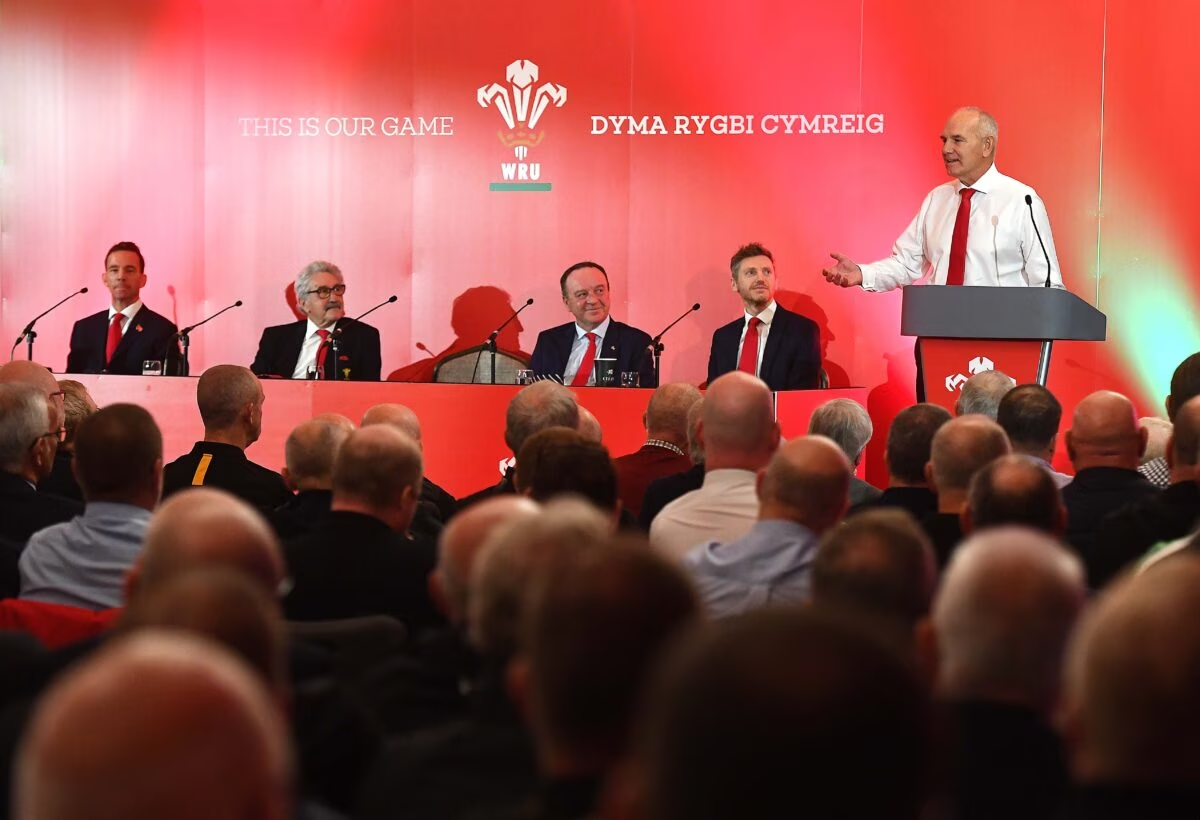Welsh Rugby Union member clubs today voted on a number of special resolutions designed to modernise key elements of the WRU’s governance structure, at the 2022 Annual General Meeting (AGM) held at Cardiff’s Parkgate Hotel.
A number of resolutions, which were passed unchallenged, were described as being designed to ‘tidy-up’ the governing body’s articles of association and other notable resolutions, which passed after debate, included:
– that voting at annual general and district meetings be on a basis of one Member, one vote (as opposed to two votes per member) – passed with a 90%-plus majority in both cases)
– that the Chair of the Community Game Board is also a Director and that any Council Member (whether a District or National Council Member) should be entitled to stand for election as Chair of the Community Game Board, rather than the position being limited to District Council Members as is currently the case – passed with an 84% majority.

Welsh Rugby Union Annual General Meeting
The resolutions which did not receive the required 75% of member votes (278 members were present and 19 proxy forms were supplied) and were therefore not passed, included:
– to permit the ability to hold virtual general meetings, if that was determined necessary (achieved a 58.5% in favour, so was not passed)
– to provide the Board with an option to appoint an additional Director to be chair of the Board, if the Board determined that was necessary (achieved a 65.6% majority, falling just under 10% of the votes needed)
– to amend the terms of office of Council Members from nine to twelve years (a 70% majority meant this resolution also failed.)

30.10.22 – Welsh Rugby Union Annual General Meeting –
General view during the WRU AGM.
Before the AGM WRU chair Rob Butcher toured member clubs and districts to explain why such a high number of special resolutions were being proposed this year and spell out the WRU’s motivations for backing them.
He appealed to clubs to vote in favour of modernisations, including giving the Board the option to appoint an independent director as chair, which he said would ensure Welsh rugby ‘would be free to realise the huge potential of the game in Wales’.
In the end, the clubs voted 65.6% in favour of the change at the meeting, but fell just under 10% short of the constitutional target.
They also rejected a call for future meetings to possibly be held via Zoom if deemed necessary by the board of directors.
“The board will now meet, reflect on the decision and I would argue we have to discuss how we can take this forward because it can contribute to making our game better,” said WRU chair Rob Butcher.

30.10.22 – Welsh Rugby Union Annual General Meeting –
WRU Chairman Rob Butcher during the WRU AGM.
“A positive was that we had a large number of people in the room who all care passionately about our game and it was a healthy and vibrant meeting from that perspective.
“But I’m still convinced in my mind it (giving the Board the option to appoint an independent chair) is the right thing to do for Welsh rugby.”
But Butcher says his Board must now revisit the proposals.

30.10.22 – Welsh Rugby Union Annual General Meeting –
General view during the WRU AGM.
“We are obviously disappointed that a number of the proposed special resolutions didn’t pass through today, but it was always going to be difficult for us with a 75% majority required to make these changes,” said Butcher.
“The Board must now take some time to reflect on what member clubs have told us and come back with new proposals.
“We remain confident that our direction of travel is correct. We must modernise, we cannot afford to stand still in the fast moving world of the professional game and that means we must have a governance structure that is fit for purpose.
“But it is also vitally important that we take our member clubs with us on this journey. The community game and our member clubs and districts are at the very heart of Welsh rugby, we are a union of member clubs and we cannot forget or overlook this fact.
“This results of this vote today tell us that our clubs are not with us, we are not united and together in the way we understand this issue and the hard work must now continue until we reach the stage where we are.”

General view during the WRU AGM.
The current Board consists of eight directors who have first been elected by member clubs to the WRU Council (two of which are nationally elected directors and six are elected by WRU districts), two Independent Non-Executive Directors (INEDs), in Henry Engelhardt and Cat Read, who are appointed by the Board, the Professional Rugby Board chair (currently Malcolm Wall – also an appointed INED) and the WRU CEO (Steve Phillips).
The latest modernisation measures would have allowed the WRU Board to appoint a fourth Independent Non-Executive director, taking the total number on the Board to 13, and appoint this individual as chair. The change would also have allowed for one of the existing INEDS to become chair (with the exception of the individual holding the position of PRB chair).
Articles currently state that only Council Members can be elected as chair by the Board.

